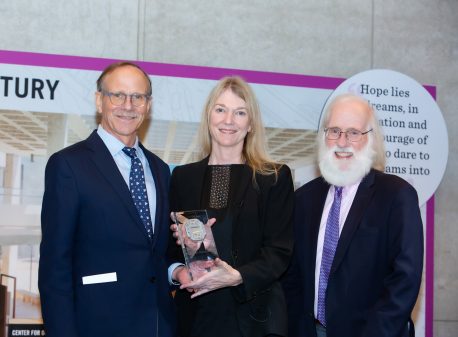
November 12, 2021
LA JOLLA—The Salk Institute has awarded neurobiologist and geneticist Cori Bargmann its prestigious Medal for Research Excellence, which recognizes a scientist who has made significant contributions in the area of basic scientific research. Bargmann, who leads the science program at the Chan Zuckerberg Initiative (CZI) and is the Torsten N. Wiesel Professor at The Rockefeller University, received her award on November 11, 2021.

“Cori Bargmann has made seminal discoveries into the relationships between genes, motivational states and behavior,” says Salk President Rusty Gage. “We are delighted to honor her with Salk’s Medal for Research Excellence in recognition of her pioneering work.”
Bargmann began her career as a graduate student in the lab of Robert A. Weinberg, a professor at MIT who was awarded the Salk Medal for Research Excellence in 2016 for his excellence in cancer research. While in his lab, Bargmann explored the mechanisms of a cancer gene called the NEU oncogene, which turned out to be relevant in human breast cancer. Targeted tumor therapies, such as Herceptin, were later developed to treat HER2-positive breast cancer, based on her research.
Following that significant discovery, Bargmann switched to the field of neurobiology, where she has used transparent worms called C. elegans to study how genes interact in the nervous system to encode behavior. For example, she has used these worms to decipher how the sense of smell works to alter their feeding behavior. Her lab is currently examining how the brain and the body interact with each other to generate physiological changes and changes in motivation. She believes that examining this question in the worm could provide insights that would be difficult to garner in more complex organisms, such as humans.
“As a neuroscientist, I believe that studying the brain will lead to exciting discoveries, and to great benefits in human health,” says Bargmann. “It’s an incredible honor to be recognized by Salk for this award. As Jonas Salk demonstrated with the polio vaccine, basic science that is aimed at the right questions can make a major impact.”
Bargmann has also been recognized with membership in the National Academy of Sciences and with the Breakthrough Prize in Life Sciences, among other honors. Prior to joining CZI, Cori served as co-chair, with Bill Newsome, of the National Institutes of Health working group that planned the BRAIN Initiative, and was an investigator of the Howard Hughes Medical Institute.
“Cori Bargmann is a tremendous choice for this award due to her extraordinary work uncovering the molecular mechanisms of cancer, and particularly her research over the past 35 years illuminating how genes are related to behaviors,” says Salk Professor Tony Hunter, who chairs the faculty committee that determines whom to honor.
In addition to Robert Weinberg, the Salk Medal for Research Excellence has previously been awarded to physiologist Donald Metcalf, gene expression pioneer Robert G. Roeder and neuroscientist Solomon Snyder.
The Salk Institute medal was designed for the Institute by French fashion designer and businesswoman Paloma Picasso. Known for her dramatic jewelry creations, she is the daughter of Pablo Picasso and painter and writer Françoise Gilot, who later married Jonas Salk.
Office of Communications
Tel: (858) 453-4100
press@salk.edu
Unlocking the secrets of life itself is the driving force behind the Salk Institute. Our team of world-class, award-winning scientists pushes the boundaries of knowledge in areas such as neuroscience, cancer research, aging, immunobiology, plant biology, computational biology and more. Founded by Jonas Salk, developer of the first safe and effective polio vaccine, the Institute is an independent, nonprofit research organization and architectural landmark: small by choice, intimate by nature, and fearless in the face of any challenge.